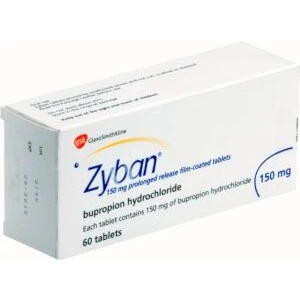Taking Zyban to Quit Smoking: How Does it Work?
Table of contents:
It’s no secret that quitting smoking is important for your health. However, dealing with cravings, withdrawal symptoms, and other challenges can make the process difficult to manage alone. This is where smoking cessation medication comes in.
Unlike some stop smoking aids like nicotine replacement therapy, prescription medications don’t contain nicotine, making them a more effective solution. Zyban is one treatment that can help you kick the habit. Its active ingredient, bupropion, impacts the neurochemistry in the brain to reduce cravings and withdrawal symptoms.
In this article, we’ll delve into the process of taking Zyban to quit smoking. This includes explaining what the medication is, how it works, and addressing some of the most frequently asked questions. Let’s begin.
START YOUR ZYBAN CONSULTATION TODAY
What is Zyban Used For?
Although Zyban is a stop-smoking medication, its active ingredient, buproprion, started as a treatment for depression and seasonal affective disorder. In 1997, it was shown that bupropion’s impact on the body could also help with smoking cessation. It was approved for this purpose in the US that same year, and subsequently in the UK in 2000.
Available in tablet form, Zyban binds to nicotine receptors in the brain and blocks their effects. This could help you kick your smoking habits in just 9 weeks, making you much more likely to quit than if you rely on willpower alone. But how does bupropion work exactly, and why take Zyban to quit smoking? Let’s explore these questions in more detail.
Bupropion Mechanism of Action: How Does Bupropion Work?
Zyban’s active ingredient, bupropion, changes the levels of neurotransmitters in the brain that are associated with the rewarding feeling you get when you smoke a cigarette. It is classified as a weak inhibitor of dopamine and noradrenaline reuptake, meaning it impacts chemicals in the brain that are associated with addictive behaviour.
When you smoke, your body absorbs nicotine from the cigarette into the bloodstream, which crosses the blood-brain barrier. This causes dopamine to be released from the pleasure-seeking pathways in the brain. When nicotine intake is reduced, dopamine reuptake occurs.
Bupropion works by blocking the reuptake of dopamine, thereby increasing its levels in the body. This reduces the effect of dopamine deficiency that is usually experienced when you quit smoking. The ingredient also inhibits the reuptake of noradrenaline, a chemical in the brain that smoking cessation can deplete, leading to symptoms such as lethargy and depression. Together, these effects can help reduce nicotine cravings and alleviate feelings of withdrawal.

Zyban for Smoking Cessation: How Does it Work?
Each Zyban tablet contains 150 mg of bupropion, which is released slowly over an extended period. This helps maintain a steady level of the ingredient in your system, making Zyban an effective stop-smoking treatment. Indeed, clinical trial results show that 1 in 5 smokers will remain smoke-free after one year with the medication.
How Effective is Zyban for Smoking?
Clinical trials have shown that around 20% of smokers who use bupropion therapy quit and are still smoke-free a year after treatment has finished. Zyban has also been proven to deliver slightly better abstinence rates when compared to nicotine replacement therapy (NRT).
Meanwhile, a Cochrane Review published in 2004 found that bupropion treatments doubled the chances of smoking cessation compared to a placebo. All of this demonstrates that taking Zyban is a highly effective way to quit smoking.
Zyban
- Suppresses cravings & withdrawal symptoms
- Nicotine-free
- May improve mood during quitting
How Long Does Zyban Stay in Your System?
After being absorbed into the gut, Zyban has a half-life of 21 hours, meaning it takes this amount of time for bupropion to be reduced by half in your system. Zyban metabolism primarily occurs in the liver, where it is metabolised into three substances:
- Hydroxybupropion
- Threohydrobupropion
- Erythrobupropion
These substances (known collectively as metabolites) are further broken down by the body and then excreted via the kidneys in urine.
Clinical research shows that bupropion is broken down (metabolised) into its most active metabolite, hydroxybupropion. Metabolites are substances that are the product of or an intermediate in the metabolism process. Hydroxybupropion is the substance that has the strongest effect on the body, meaning it does most of the heavy lifting when it comes to quitting smoking.
Hydroxybupropion metabolism is carried out by the enzyme CYP2B6. As a result, the rate at which Zyban is absorbed by the body can be reduced by medications known as “CYP2B6 inhibitors”, such as:
- Clopidogrel
- Diazepam
- Norfluoxetine
- Orphenadrine
- Paroxetine
- Sertraline
- Ticlodipine
By blocking the CYP2B6 enzyme, taking any of these medications concurrently with Zyban can result in reduced production of hydroxybupropion – the form of the medication that is most effective in reducing cravings. One clinical trial found that taking 150 mg of bupropion with either 75mg of clopidogrel or 250mg of ticlopidine twice a day for 4 days reduced the level of hydroxybupropion by 52% in the clopidogrel group and 84% in the ticlopidine group.

At the same time, bupropion may remain in your system for longer, increasing the chance of serious side effects. For example, high doses of bupropion in the body can cause seizures. Therefore, Zyban may not work as well for giving up smoking if you are also taking a CYP2B6 inhibitor.
Meanwhile, there are other medicines and remedies known as “CYP2B6 inducers”. If taken alongside Zyban, these medications can cause drug interactions that make bupropion less effective. One study investigating the effects of rifampicin, an antibiotic and CYP2B6 inducer, found that it reduces the half-life of bupropion from 15.9 hours to 8.2 hours, increasing its elimination from the body. It also increased the maximum concentration of hydroxybupropion, speeding up its elimination from the body.
CYP2B6 inducers include:
- Carbamazepine
- Clotrimazole
- Phenobarbital
- Rifampicin
- St John’s Wort
Frequently Asked Questions About Taking Zyban to Quit Smoking
If you’re considering taking Zyban to quit smoking, you’ll probably have some questions about how quickly it works, what happens when you stop taking it, and where you can get it. Here, we address some of these pressing questions to help you make an informed decision about whether the treatment is right for you.
How Long Does it Take for Zyban to Kick In?
Zyban for smoking cessation usually starts to show some positive effects within the first week, but it can take 7 to 9 weeks to work. Most people will take Zyban for 7 to 9 weeks before their clinician will advise them to stop taking it gradually.
Zyban is taken while you are still smoking, and you’ll set a target quit date for your second week of treatment. If you haven’t quit smoking after 7 weeks, your clinician may suggest an alternative quit smoking medication.
How Long Should I Take Zyban for Quitting Smoking?
For most people, a course of Zyban for quitting smoking lasts between 7 and 12 weeks. However, your clinician will work with you to determine the exact duration of treatment based on your individual needs and how much you have progressed.
Ideally, you will quit smoking in the second week of Zyban treatment. Then, you will continue taking one tablet twice a day for up to 9 weeks. If you have quit smoking at this time, your clinician will advise you to stop taking the medication and will tell you how to do this. If you haven’t quit after 7 weeks of taking Zyban, your clinician will tell you to stop taking it as it is unlikely to work for you.
What Happens When You Stop Taking Zyban?
Zyban does not contain nicotine, so it is not addictive. However, you may notice changes in your mood, sleep, or a return of cigarette cravings. Because Zyban helps reduce nicotine dependence, stopping it suddenly can sometimes make quitting smoking harder. That’s why it's essential to follow your clinician's advice.
Your clinician may recommend that you stop taking Zyban gradually rather than stopping abruptly, especially if you have been taking it for several weeks. This approach can minimise unwanted effects, such as irritability, restlessness, or difficulty concentrating, and gives you the best chance to remain smoke-free once the medication is stopped.
Where Can I Get Zyban?
Zyban is a prescription-only medication, which means you will need a clinician’s approval before you can get it. It is available on the NHS following a consultation with your GP, but it can also be obtained with a private prescription from Prescription Doctor.
If your order is approved before 3pm on a weekday, we’ll dispatch your medication in discreet packaging via our next-day delivery service, so you can start quitting straight away and avoid lengthy NHS wait times.
An Effective Stop-Smoking Service
If you’re thinking about quitting smoking, it’s important that you have a reliable support network in your corner. This is where Prescription Doctor can help.
In addition to providing effective smoking cessation medication, our holistic service is designed to offer tailored guidance and advice whenever you need it. Our experienced clinicians will regularly check in with you to monitor progress and are available to answer any questions you may have.
We also have a library of stop-smoking information at your fingertips. Whether it’s providing a low-down of taking Zyban to quit smoking, helping social smokers to kick the habit, or exploring the timeline of events that take place during your smoke-free journey, we have you covered.
Ready to take Zyban to quit smoking? Start your consultation today.
Sources
- Drug Metabolism and Disposition (2009): Inhibition of Human CYP2B6-Catalysed Bupropion Hydroxylation by Ginkgo biloba Extract: Effect of Terpene Trilactones and Flavonols.
- EMC (2024): Zyban 150 mg prolonged release tablets.
- National Library of Medicine (2024): Bupropion.
- PubMed (2005): Effect of clopidogrel and ticlopidine on cytochrome P450 2B6 activity as measured by bupropion hydroxylation.
- PubMed (2005): How does bupropion work as a smoking cessation aid?
- PubMed (2006): Cytochrome P450 2B6 activity as measured by bupropion hydroxylation: effect of induction by rifampin and ethnicity.
- PubMed (2008): The use of bupropion SR in cigarette smoking cessation.
- PubMed (2013): Randomized trial of nicotine replacement therapy (NRT), bupropion and NRT plus bupropion for smoking cessation: effectiveness in clinical practice.
- PubMed (2008): Antidepressants for smoking cessation.
- PubMed (2019): Effectiveness and Safety of Bupropion in Children and Adolescents with Depressive Disorders: A Retrospective Chart Review.
Authored By

Leanne Edermaniger
Medical Content WriterPublished on: 27/03/2024 Re-Published on: 03/10/2025
Reviewed By

Mohamed Imran Lakhi
MPharm - Lead PharmacistReviewed on: 03/10/2025
© 2013 - 2026 Al Muhsineen Limited. All Rights Reserved. Registered Pharmacy: 34 Halliwell Road, Bolton BL1 8RL. Registered Office: 254 First Floor, Shearbrow, Blackburn, England, BB1 8DS







